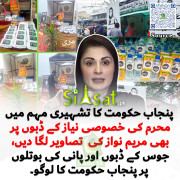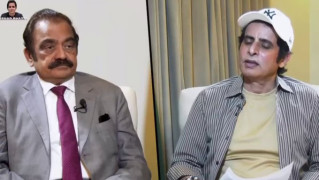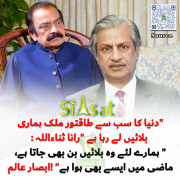Vitamin_C
Chief Minister (5k+ posts)
Uncommon tongue: Pakistan's confusing move to Urdu
By M Ilyas KhanBBC News, Islamabad
12 September 2015
While many nations are adopting English, Pakistan is going the opposite way, with the Supreme Court ruling for it to be replaced with Urdu as the official language.
Urdu is beautiful, vastly expressive, and the medium of some of the most powerful literature generated in the Indian sub-continent over the last two or three centuries.
It is spoken by many in Pakistan, especially in the main urban centres.
But there is no region in Pakistan which can be categorised as originally Urdu-speaking.
And Urdu has also been a victim of the early rulers' controversial desire to thrust administrative, political and linguistic uniformity over the country's local cultures, causing political alienation.
Many believe the seeds of secession in East Pakistan (now Bangladesh) were sown when Pakistan's founder Mohammad Ali Jinnah announced in 1948 that Urdu alone would be the state language of Pakistan, though East Pakistan could use Bengali as its provincial language.
East Pakistan, which was home to a majority of the Pakistani population who had hoped Bengali would become the second state language after Urdu, seceded in 1971.

Pakistan's founder Mohammad Ali Jinnah caused divisions when he picked Urdu as the state language
Some in Pakistan view the current Supreme Court judgement as the continuation of that policy.
An ethnic Pashtun tweeter calling himself Durandline (the name for the border between Afghanistan and Pakistan) recently tweeted that "Urdu is not the language of majority, still it is the national language of Pakistan. Even in linguistics, minority is imposed on majority."
Naina Baloch tweeted: "Urdu is the language of Mohajirs (refugees from India) and this does not make sense that a country adopts the language of refugees as its national language."

English is used even in Pakistan's remote northern regions
Pakistan's many languages
English and Urdu are not even the most common first languages in Pakistan, despite their official adoption.
There are numerous other languages spoken by minorities in the population, including Brahui, Burushaski and Hindko.
Source: CIA Factbook
Many others see the move as likely to undermine major investment in English medium education during the last few decades.
"It's not like the 1960s or '70s when knowledge of English language used to be the preserve of a small class of political and business elite," says Wasim Ahmad Shah, the Peshawar-based legal affairs correspondent of Dawn newspaper.
"Nearly every village in Pakistan has at least one privately run English medium school these days, and there is a proliferation of English language material in print and on electronic media."
Professor Ijaz Khan, who heads Peshawar University's International Relations department, says over-emphasis on Urdu may erode this progress and take the country in a direction "180 degrees opposite to that of the rest of the world", which is increasingly using English as their lingua franca.

"God bless you", written in Urdu - the language is a favourite among poets
"It will curtail the motivation to learn English, and in the long-run cause disconnect between us and the rest of the world, both politically and economically," he says.
There are also questions over whether an efficient switch-over would be possible.
"There are millions of pages of laws and statutes, court rulings, legal commentaries and digests which lawyers use to formulate their cases," says Mohammad Haroon, a senior lawyer who practices at the Nowshera district courts in Khyber Pakhtunkhwa (KP) province.
"I don't see any administrative capacity to build suitable Urdu vocabulary, translate all material and knock new jargon into our heads all in a generation's time," he says.
'Prostitute' pun
Since the 1990s, successive governments have set up institutions to research and create technical Urdu terms for use in the five main fields, namely government, administration, judiciary, military and education.
In 2005, the head of the National Language Promotion Department (NLPD), Prof Fateh Mohammad Malik, "reported that there was enough vocabulary to shift all government from English to Urdu if desired," writes Dr Tariq Rehman, a Lahore-based linguist and academic, in a recent newspaper column.

There are fears that the move to Urdu could affect teaching practices
The problem is that since most Pakistanis are not Urdu speakers, many Urdu terms that meant one thing in northern India, the home of Urdu language, would mean quite another in Pakistan.
When a religious alliance, Muttahidda Majlis-e-Amal (MMA), came to power in KP in 2002, they decided to draw on NLPD's diction to Urduise, and thereby Islamise, the provincial administration.
They were "in power for five years, but Urdu went nowhere further than causing a lot of confusion in office work, and turning terminologies into jokes," says Ismail Khan, resident editor of Dawn newspaper in Peshawar.
For example, the term "office circular" is known to all and sundry, but its rendition in Urdu, G-A-S-H-T-I marasala, not only sounded strange, it created room for ridicule.
"The word '******', which literally means 'on the move', or roaming about, is often taken to mean a prostitute in these parts," he explains.
Likewise, an official from Kabul, where office work is conducted in Pashto and Persian, used the term "Star Munshi" for a Pakistani chief secretary.
The chief secretary, whose designation means he is the top bureaucrat of a province, was furious, recalls Ismail Khan.
The reason: while Munshi in India or Kabul may mean a respectable official, in Pakistan it is mostly understood to mean a lowly cashier or clerk of a ration depot or a brick kiln.

The red-and-blue sign in Urdu at this checkpoint spells "stop" instead of the Urdu word "ruko", suggesting that "stop" is part of the local vocabulary
KP dropped Urdu as the official language towards the end of MMA rule.
Professor Ijaz Khan points out that national language mattered in the world of the 1960s and 1970s because nation states were asserting their individuality at that time, which is not the case now.
"English is not a colonial language any more, it is the lingua franca of the world."
But the urge for cultural uniformity can still find takers, and so can dissent.
A tweeter, Wajahat, fended off trollers by asserting: "Suggesting that English should remain the (official) language instead of Urdu doesn't mean I'm a traitor or I suck up to the West."
http://www.bbc.com/news/world-asia-34215293
(The censored word was G-A-S-H-T-I marasala. It means Office circular in Urdu.)
By M Ilyas KhanBBC News, Islamabad
12 September 2015
While many nations are adopting English, Pakistan is going the opposite way, with the Supreme Court ruling for it to be replaced with Urdu as the official language.
Urdu is beautiful, vastly expressive, and the medium of some of the most powerful literature generated in the Indian sub-continent over the last two or three centuries.
It is spoken by many in Pakistan, especially in the main urban centres.
But there is no region in Pakistan which can be categorised as originally Urdu-speaking.
And Urdu has also been a victim of the early rulers' controversial desire to thrust administrative, political and linguistic uniformity over the country's local cultures, causing political alienation.
Many believe the seeds of secession in East Pakistan (now Bangladesh) were sown when Pakistan's founder Mohammad Ali Jinnah announced in 1948 that Urdu alone would be the state language of Pakistan, though East Pakistan could use Bengali as its provincial language.
East Pakistan, which was home to a majority of the Pakistani population who had hoped Bengali would become the second state language after Urdu, seceded in 1971.

Pakistan's founder Mohammad Ali Jinnah caused divisions when he picked Urdu as the state language
Some in Pakistan view the current Supreme Court judgement as the continuation of that policy.
An ethnic Pashtun tweeter calling himself Durandline (the name for the border between Afghanistan and Pakistan) recently tweeted that "Urdu is not the language of majority, still it is the national language of Pakistan. Even in linguistics, minority is imposed on majority."
Naina Baloch tweeted: "Urdu is the language of Mohajirs (refugees from India) and this does not make sense that a country adopts the language of refugees as its national language."

English is used even in Pakistan's remote northern regions
Pakistan's many languages
English and Urdu are not even the most common first languages in Pakistan, despite their official adoption.
- 48% speak Punjabi, mainly in eastern Punjab province
- 12% speak Sindhi, mainly in south eastern Sindh province
- 10% speak Saraiki, a variant of Punjabi
- 8% speak Pashto, in west and north western Pakisan
- 8% speak Urdu
- 3% speak Balochi, mainly in Balochistan
- English is the most popular among government ministries
There are numerous other languages spoken by minorities in the population, including Brahui, Burushaski and Hindko.
Source: CIA Factbook
Many others see the move as likely to undermine major investment in English medium education during the last few decades.
"It's not like the 1960s or '70s when knowledge of English language used to be the preserve of a small class of political and business elite," says Wasim Ahmad Shah, the Peshawar-based legal affairs correspondent of Dawn newspaper.
"Nearly every village in Pakistan has at least one privately run English medium school these days, and there is a proliferation of English language material in print and on electronic media."
Professor Ijaz Khan, who heads Peshawar University's International Relations department, says over-emphasis on Urdu may erode this progress and take the country in a direction "180 degrees opposite to that of the rest of the world", which is increasingly using English as their lingua franca.

"God bless you", written in Urdu - the language is a favourite among poets
"It will curtail the motivation to learn English, and in the long-run cause disconnect between us and the rest of the world, both politically and economically," he says.
There are also questions over whether an efficient switch-over would be possible.
"There are millions of pages of laws and statutes, court rulings, legal commentaries and digests which lawyers use to formulate their cases," says Mohammad Haroon, a senior lawyer who practices at the Nowshera district courts in Khyber Pakhtunkhwa (KP) province.
"I don't see any administrative capacity to build suitable Urdu vocabulary, translate all material and knock new jargon into our heads all in a generation's time," he says.
'Prostitute' pun
Since the 1990s, successive governments have set up institutions to research and create technical Urdu terms for use in the five main fields, namely government, administration, judiciary, military and education.
In 2005, the head of the National Language Promotion Department (NLPD), Prof Fateh Mohammad Malik, "reported that there was enough vocabulary to shift all government from English to Urdu if desired," writes Dr Tariq Rehman, a Lahore-based linguist and academic, in a recent newspaper column.

There are fears that the move to Urdu could affect teaching practices
The problem is that since most Pakistanis are not Urdu speakers, many Urdu terms that meant one thing in northern India, the home of Urdu language, would mean quite another in Pakistan.
When a religious alliance, Muttahidda Majlis-e-Amal (MMA), came to power in KP in 2002, they decided to draw on NLPD's diction to Urduise, and thereby Islamise, the provincial administration.
They were "in power for five years, but Urdu went nowhere further than causing a lot of confusion in office work, and turning terminologies into jokes," says Ismail Khan, resident editor of Dawn newspaper in Peshawar.
For example, the term "office circular" is known to all and sundry, but its rendition in Urdu, G-A-S-H-T-I marasala, not only sounded strange, it created room for ridicule.
"The word '******', which literally means 'on the move', or roaming about, is often taken to mean a prostitute in these parts," he explains.
Likewise, an official from Kabul, where office work is conducted in Pashto and Persian, used the term "Star Munshi" for a Pakistani chief secretary.
The chief secretary, whose designation means he is the top bureaucrat of a province, was furious, recalls Ismail Khan.
The reason: while Munshi in India or Kabul may mean a respectable official, in Pakistan it is mostly understood to mean a lowly cashier or clerk of a ration depot or a brick kiln.

The red-and-blue sign in Urdu at this checkpoint spells "stop" instead of the Urdu word "ruko", suggesting that "stop" is part of the local vocabulary
KP dropped Urdu as the official language towards the end of MMA rule.
Professor Ijaz Khan points out that national language mattered in the world of the 1960s and 1970s because nation states were asserting their individuality at that time, which is not the case now.
"English is not a colonial language any more, it is the lingua franca of the world."
But the urge for cultural uniformity can still find takers, and so can dissent.
A tweeter, Wajahat, fended off trollers by asserting: "Suggesting that English should remain the (official) language instead of Urdu doesn't mean I'm a traitor or I suck up to the West."
http://www.bbc.com/news/world-asia-34215293
(The censored word was G-A-S-H-T-I marasala. It means Office circular in Urdu.)
Last edited by a moderator:






































